Momma Interviews "Expert Edition" featuring Jacqueline Cohen
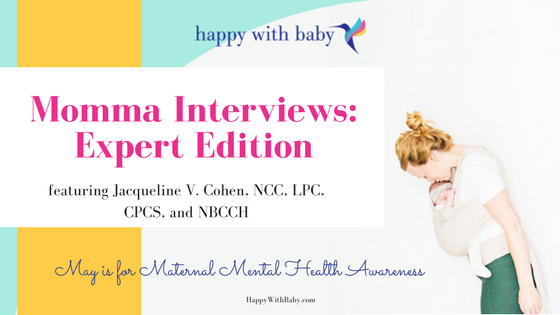
May is Maternal Mental Health Awareness Month, so I've relaunched my "Momma Interviews" series--This time with an extra special set of moms. These mommas also work to support other moms and their families during the transition into new parenthood and beyond. I'm calling it the "Expert Edition", but I think you'll find that while these women definitely are experts in their work, parenthood has a way of making a beginner out of everybody. Even experts get surprised by the unexpected and learn new bits of wisdom while in the trenches!
This series is all about their experiences with motherhood, in the hopes that it provides you with some validation and new tips to try. Because for all the many different ways there are to be a mom (and there are definitely MANY ways to do it right), it's so amazing how much we moms all really have in common.
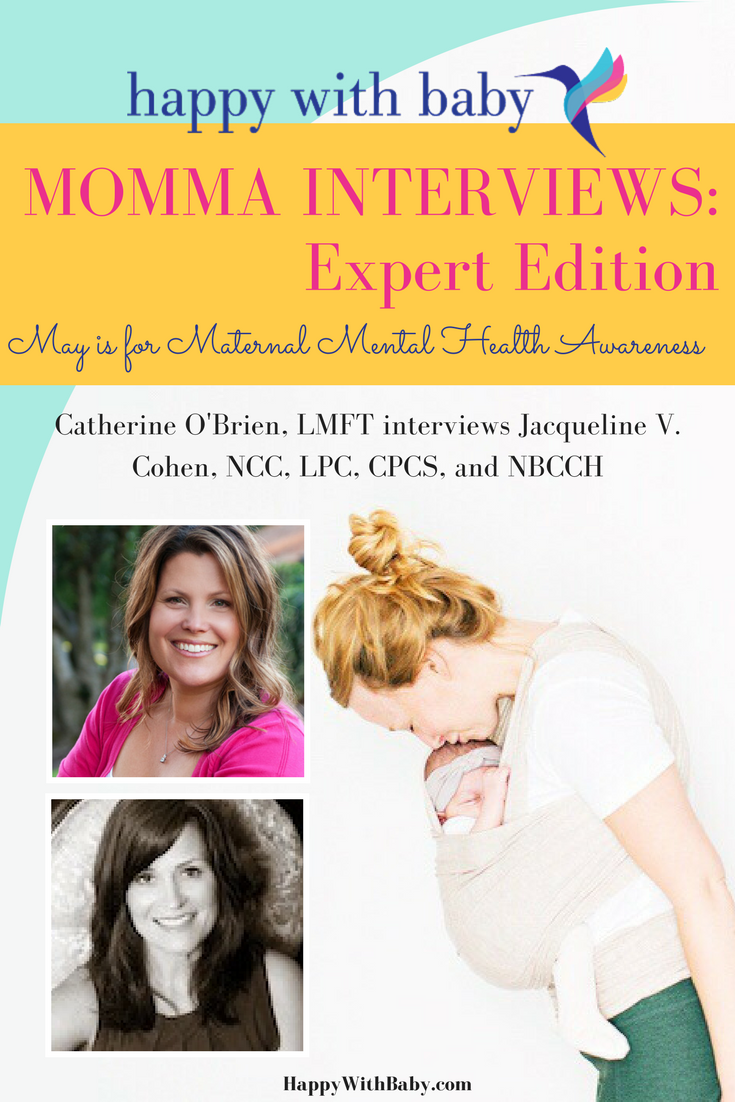
Mommas, I'm so excited to share this interview with Jacqueline Cohen with you!
Today, Catherine O'Brien, LMFT interviews Jacqueline Cohen. Jacqueline is a mom, Licensed Professional Therapist specializing in perinatal mood and anxiety disorders in moms and dads. She is also a survivor of postpartum depression and anxiety herself and an advocate for all parents.
Scroll down to watch the interview, read the transcript or learn more about Jacqueline.
Get to Know Jacqueline:
MY UNIQUE FAMILY MAKE-UP:
Married with 2 kids.
I've had parents tell me that one of the hardest things about being a parent is the comparisons and judgements from other parents. How do you personally cope with that?
Generally, I really don't care what others think. What would affect me most is my inner critic. If someone else's criticism agrees with my inner critic, that would be when I feel the most inadequate.
What is your favorite quote that inspires you as a mom?
"Don't compare yourself to other Mothers. We are all losing our shit. Some just hide it better than others". Mum's Grapevine
What is your favorite maternal mental health resource?
Postpartum Support International
Watch the Video:
https://www.youtube.com/watch?v=lQagkOweJvw&w=854&h=480
JACQUELINE's Quotables:
Interview Transcript:
Catherine: Okay so, welcome to the Momma Interviews, today I have Jacqueline Cowan who's a licensed professional counselor out in Centennial, Colorado. I almost said Georgia, but I didn't. But anyways, Jacqueline, I'm so happy to have you on here, I've been wanting to talk to you for a long time. I know we met, was it almost two years ago at one of the PSI conventions-
Jacqueline: Yes.
Catherine: Or conferences, and that was just totally ... Loved you from the moment I saw you, but tell us a little bit about what compelled you to get involved in maternal mental health.
Jacqueline: So, I'm a survivor of postpartum depression, and anxiety, and when I went to graduate school, this is my second career. So when I started graduate school I was pregnant with my second child, and I knew I wanted to focus on maternal mental health because of my experience, and so my oldest is 16 now, so back then there was really no resources. There was nothing out there. The only thing that was being discussed was Brooke Shields had just come out with her book, and Tom Cruise said that there's no such thing, and she just needs to be getting exercise, and taking vitamins.
Catherine: Right. So that was-
Jacqueline: So ...
Catherine: Yes, I remember that.
Jacqueline: So yeah, it's such a common thing, and just being a mom myself, I just ... It's been my passion, so ...
Catherine: Yeah, no, that's great.
Catherine: Okay, so tell us then, what would you like all moms to know about maternal mental health?
Jacqueline: So, don't be afraid to ask for help, that it will always take a village.
Catherine: Yeah.
Jacqueline: No matter how old they are, and that motherhood really isn't supposed to be easy, and it's not easy, so you're not alone in the struggle. So, asking for help in any way, shape or form whether it's getting more childcare so that you can have more time to yourself, support groups, just mom groups, it can be therapy, just whatever it is, that you feel like that you have a support system because we couldn't get through any of that without a support system.
Catherine: Yeah, I think that's so huge, and I feel like I talk to moms, I don't know if you do in your practice as well-
Jacqueline: Yeah.
Catherine: That just having a difficult time finding those support systems, or feeling like moms get them, or they're the only mom that doesn't fit in.
Jacqueline: Right.
Catherine: And then it's like, how do you help ... How do you find them? And I feel like sometimes there's a lot of us that feel like we don't fit in.
Jacqueline: I know.
Catherine: You know? So it's like, all these people that don't fit in need to find each other to get that support-
Jacqueline: I know.
Catherine: Because you can't do it, and maybe they don't even have to be moms, but some other people that you connect with, and feel supported by that-
Catherine: In whatever ... Yeah, and not judged. Yeah, that's huge.
Jacqueline: Yes.
Catherine: That's huge.
Jacqueline: Yes, absolutely. I mean, I do work with a lot of moms, and I really think it is sort of saying that it's okay for it to be hard, it's okay for there to be days where you don't like being a mother, but that's just how you're feeling that day.
Catherine: Yeah.
Jacqueline: And that's okay.
Catherine: Yeah, it doesn't make you a bad mom.
Jacqueline: It doesn't make you a bad mom, it doesn't mean you don't love being a mom in the big picture, or love your children, but you know, they're their own little human beings, and...
Catherine: Yes.
Jacqueline: They're not very compliant.
Catherine: No, they have their own ...
Jacqueline: They have their days.
Catherine: Right?
Jacqueline: Yes.
Catherine: So tell us how do you balance being a mom, working, and then also your relationship roles?
Jacqueline: Well, I think it's understanding that balance looks different every week, and that it's really doing the best that you can. I don't know if I can say that I ever really feel balanced, but it really is just, it's thinking about priorities versus demands, and if I'm feeling overwhelmed, really paying attention to what do I really have to do? And then letting go of what I don't.
Catherine: Yeah.
Jacqueline: So even if it's we're having cereal tonight ...
Catherine: Before you have milk.
Jacqueline: Yeah, you know, whatever you can find, it's make your own dinner night.
Catherine: Yes.
Jacqueline: And that's okay, and so really as long as ... For my kids, as long as they feel loved, and seen, and heard, then I'm doing a good job.
Catherine: I love that.
Jacqueline: Yeah. So, I really do try to be intentional of making time for myself, and being aware of what I'm feeling, and what I'm needing. With my kids being teenagers now, it is a lot easier in a sense. I do have more freedom to move about than you do when your kids are smaller, but there's just other things to worry about when they're teenagers.
Catherine: Yeah, I feel like that just is a whole nother era of challenges, right?
Jacqueline: Yes. Right, that's why it always say it takes a village.
Catherine: Yeah, yeah.
Jacqueline: You know? So it's just doing the best you can, and that being balanced means we can't give 100% to everything that we're doing, and that's okay.
Catherine: Yeah, that is okay.
Jacqueline: Yes. Again, motherhood not meant to be easy.
Catherine: No, definitely not.
Jacqueline: No.
Catherine: And I think people think that it is-
Jacqueline: Right.
Catherine: Or they see other people and they're like, "Oh, well they're making it look easy." And again, I have moms tell me that all the time, it's like, well it looks so easy for everybody else.
Jacqueline: Yeah.
Catherine: "I know other moms don't get mad and yell at their kids, I know ..." I'm like, yes they do.
Jacqueline: Yeah they do. Yeah.
Catherine: Yeah.
Jacqueline: And we're only looking at a glimpse, and it's usually if we're thinking that other moms are doing it easier, or more easily, then usually for me that means I am struggling with something, so I'm comparing myself, and if you're comparing, then it's like, "I'm not enough if she is."
Catherine: Right.
Jacqueline: As opposed to you know, "I can be doing enough, and she can be doing enough, and it can look different. It doesn't have to be one or the other."
Catherine: Right.
Jacqueline: And what this mom maybe has a calmer personality in general, that doesn't mean that there may be something else that she struggles with as a mother that is easier for me. And so, it's not easy for anyone, it's just different.
Catherine: Yeah.
Jacqueline: So, I think just sort of radically accepting that it's hard makes it easier.
Catherine: Right, right.
Jacqueline: You know?
Catherine: Yeah.
Jacqueline: Accepting what is.
Catherine: Right.
Jacqueline: Then we can do something as opposed to wanting things to be other than they are.
Catherine: And if they're not that way, then somehow you're like, failing in it.
Jacqueline: Right, exactly. Right. So ...
Catherine: So what is your greatest lesson that you've learned as a mom?
Jacqueline: Really to just be myself.
Catherine: Yeah.
Jacqueline: It's always when I'm the happiest is just being myself, and trying to be my own cheerleader, so any little win is a, "Yay me!" It helps me focus on the positive instead of just what I feel is negative, or what I interpret as negative. But I think that we ... For me, I'm always learning about myself from my children. They grow, I grow, and I'm learning how to parent with them, so we try to be vulnerable in front of our kids so that they know that they can be vulnerable, and we're human beings, so we're not perfect, and personal accountability.
Catherine: Yeah. I feel like we are supposed to know how to parent, like out of the gate. Like I should know how to be a parent.
Jacqueline: Right.
Catherine: And I have two kids, and I feel like what I thought I knew with the first one is totally different with the second one.
Jacqueline: Yeah.
Catherine: It's just proof that we don't know really what we're doing-
Jacqueline: Yeah.
Catherine: And we do, we have to grow. We learn to parent better with them, we're not supposed to know it all-
Jacqueline: Right.
Catherine: Just out of the gate, yeah.
Jacqueline: Right, and ... Shoot, I had a point, and I forgot it. Yeah, and being a therapist, and having all this professional knowledge. It's like, "Oh I know how to be listening, and all of that with my kids," and when I try to do that they're like, "Mom, stop."
Catherine: Yeah.
Jacqueline: So even the knowledge as a therapist that-
Catherine: They don't want the therapist mom.
Jacqueline: They don't, and I'm not trying to be a therapist, I'm just trying to listen to them and acknowledge their feelings, you know? Which you read in the books, but no they're like, "Stop it." So even when you think you have a lot of knowledge of stuff, it doesn't mean that your kids are gonna respond to that.
Catherine: Yeah.
Jacqueline: So you just ... They are their own little people.
Catherine: Yeah.
Jacqueline: Sometimes you're doing the best that you can, and it's just not what they want or need, and then they won't tell you what they want or need, and it's very frustrating, so ...
Catherine: Well, I think that's good to hear from a therapist, and a mom.
Jacqueline: Yeah.
Catherine: Because I think we ... Or I know, sometimes I'll share certain things with my clients of things that I hear out there and about in the therapist world and they're always shocked, like it's somehow we should know more, or know how to do things better, and I think it is all just a learning curve with each individual child, and-
Jacqueline: Yeah.
Catherine: With your family, you just don't know, it's all trial and error constantly.
Jacqueline: Yeah, it is.
Catherine: Sometimes you do a really good job-
Jacqueline: Right.
Catherine: And you succeed, and other times it's like, "What did I get myself into?"
Jacqueline: I know. It is, and when I have had wins it is just like, "The universe all came together."
Catherine: Yeah, right? Yeah and then it's like, "What did I do?"
Jacqueline: Yeah.
Catherine: "What did I do different that time?" I don't know-
Jacqueline: Just sometimes it works-
Catherine: The stars aligned-
Jacqueline: Yes, it really is about the stars aligning because ... Yeah.
Catherine: Well, what do you feel like is your greatest personal struggle with the experience of motherhood?
Jacqueline: So, I have ADHD, and wasn't aware of it until I hit 40 when my son was diagnosed, which actually is a lot of times women my age find out that they have it just due to the past 25 years of research on girls and women, and so really ages 35 to 65 is now the highest age group of individuals being diagnosed just due to research.
Jacqueline: And so, what is hard having ADHD is that the daily things that we do that require no thought, those are the hardest to do because our executive functioning doesn't work like a neurotypical's do, and we need constant stimulation, so if it doesn't require stimulation it is very, very difficult to do. And so ...
Catherine: Like can you give an example?
Jacqueline: Just the roles and expectations of women, and mothers in general are cultured, that's hard for any mother.
Catherine: Right.
Jacqueline: And keeping up with everything, you know, making doctor's appointments, for school it's filling out forms, it's food planning, going to the grocery store, keeping up with the laundry, keeping up with the day to day things that we have to keep up with, or when you think of just like social expectations of being the social planner, or writing thank you notes, or bringing a hostess gift, those things I am awful at, and so just feeling like things that are easier for other people, that would seem to be easy, you know?
Catherine: Yeah.
Jacqueline: Just are the hardest.
Catherine: Yeah.
Jacqueline: And so, just never feeling like I'm caught up.
Catherine: Yeah. That is really hard.
Jacqueline: And just much more easily overwhelmed, so it really does not take me much to get overwhelmed.
Catherine: Right, so what do you do to help manage some of that then?
Jacqueline: Well, it is really ... It's keeping an open dialogue with my husband about roles and expectations, so that he's not kind of left with the burden of everything, but working together, and letting go of certain things that just aren't important. So while I would love for my house to look like Better Homes and Gardens, as I'm sure anybody would.
Catherine: Right.
Jacqueline: It's just not reasonably. That's not reasonable for any mom, especially if you have kids, and we have two dogs, and a cat, and the more you have living in the a space the harder it is to keep it organized. But now that they're older it's really you can make your own lunch, you can do your own laundry. I had to let go whether they had clean underwear or not, you know?
Catherine: Well, the natural consequence-
Jacqueline: Right.
Catherine: Like if you don't do your laundry, you don't have clean underwear.
Jacqueline: Yeah. So, it's again, priorities versus demands, and just being very kind to myself. And it's putting systems in place for me, to help me. Organization is not one of my things that I struggle with, the planning I do very much. So it really is just putting systems in place so that I can do these things, and I have an ADHD coach, which helps a lot, and for me, help me understand how my brain works, it helps me with my son, so that I can help him live really well with ADHD.
Catherine: Yeah.
Jacqueline: Because he'll know how his brain works, and he'll know systems, and strategies to be able to do whatever he wants to do.
Catherine: Before he's 40.
Jacqueline: Before he's 40, yeah.
Catherine: That's a gift, that's awesome.
Jacqueline: Yes.
Catherine: Yeah.
Jacqueline: Yeah, so ... Yeah.
Catherine: Yeah, well cool. So, what is one piece of advice? If you could come up with just one, that you would like to give other moms. I know you've said a lot of awesome things, so I know, but like one thing.
Jacqueline: It really is to allow your humanness, and to cultivate the kind of mother that you want to be based on your own value system not anyone else's value system, what's really important to you, and I think that's ... Giving yourself space to be the mother that you want to be.
Catherine: Yeah.
Jacqueline: That includes you being a human being.
Catherine: Yeah. I love that, because that's ... Yeah, so true, and so pretty much everything you've said today. Well, thank you so much for being here, and coming on, and sharing your wisdom.
Jacqueline: Thanks for having me.
Catherine: Where can people find you? Yeah.
Jacqueline: So my website is www.therapymomma.com and I have a ... I try to blog, but again, that's one of the things that I don't do well.
Catherine: It's hard.
Jacqueline: Every single week, but I have no gotten that into my routine. But I also have an Instagram page, and a ...
Catherine: And you share great things on there, I follow you on there.
Jacqueline: Thank you.
Catherine: And I love the things that she shares, so if you need some inspiration, or support, or encouragement, then definitely follow her on Instagram.
Jacqueline: Thank you. I'm also going to be presenting at the postpartum support international conference this year on understanding ADHD, and how it affects women during pregnancy in the postpartum period.
Catherine: Wow, that sounds awesome.
Jacqueline: So if anybody's going, please come.
Catherine: I know, I'm trying to figure it out, it always falls ... It's been falling around our vacation, so-
Jacqueline: Yes, it's hard, and it's expensive, but I'll try to share some of the things that I'll be putting in the presentation on my blog if I can.
Catherine: Yeah. I'm beginning to think I might have ADHD, too, because I seem to not be able to do some of the basic things, and the only way I could get regular blogs out is having someone to help me get them posted because I can't ... I have the information, I just don't seem to be able to follow through with the actual ...
Jacqueline: Well, another thing that's gotta be real. If you're ... If it's just you, and your business, there's a lot to keep up with.
Catherine: There is a lot to keep up with.
Jacqueline: You know? And so it is like ... There's only so much time in the day.
Catherine: Yeah. Well, and I think it's like yeah, and being a mom, and everything, too.
Jacqueline: Yeah.
Catherine: We work, most people work, and even if you're a stay at home mom, like there's so many things that you're doing.
Jacqueline: There's so many things, yeah.
Catherine: So it's like, giving yourself credit, it doesn't all get done, and it doesn't all look perfect.
Jacqueline: Right, exactly.
Catherine: Even if it looks like that for other people on social media, it's not true.
Jacqueline: Right.
Catherine: What's the behind the scenes?
Jacqueline: Right, exactly. I mean, social media is not meant for us to put all of the hard things.
Catherine: No.
Jacqueline: I mean, sometimes we do.
Catherine: Yeah.
Jacqueline: A lot of the time, you know? We have to just be aware that's what social media is.
Catherine: Yeah.
Jacqueline: It's like, here's my happy moments.
Catherine: Right, right. Well, thank you so much again.
Jacqueline: Thank you.
Catherine: So love talking with you, Jacqueline.
Jacqueline: I know, I hope to see you at the conference. If not, then you know ...
Catherine: Eventually at one of them.
Jacqueline: Chat on the phone, or yeah. Thank you so much.
Catherine: Thank you.
Jacqueline: Okay.
Catherine: All right ... But yeah, thank you. I love talking with you.
Jacqueline: I appreciate you having me on.
Catherine: Yeah. We should chat regularly. I love the information you have about ADHD. In fact, I'm like, I think one of my clients might be ADHD, like undiagnosed.
Jacqueline: Yeah, so the perspective that I'm gonna be using in the presentation is for women who have been diagnosed, and really understand their brain, and are living well with it versus women who have been diagnosed, but don't really understand how their brain works, and then women who have not yet been diagnosed, because it really is having the ADHD isn't the issue, it's how we respond, or not respond to it that can cause problems.
Catherine: Yeah.
Jacqueline: But you really have to understand how your brain works, and ...
Catherine: So you definitely have to get that up on your website then so I can refer people to it, but what other resources would you recommend for women?
Jacqueline: What is a really good book, and I think I have it on my website, is Sari Solden's Women with ADD book.
Catherine: Sari Sold?
Jacqueline: It's S-O-L-D-E-N. And she is a therapist who has ADHD, and they specialize in women in ADHD, and so for me what was great, I didn't read that until a couple of years after I got diagnosed because it was like okay, well I took medicine, and it helped, but I still didn't really understand why I felt the way that I did, and so her book articulates it really, really well, like I would never have been able to articulate what it's like for me.
Catherine: Okay.
Jacqueline: Until I read her book and I was like, that's exactly it, and she comes at it from a biopsychosocial perspective, which when I work with my clients I do the same thing.
Catherine: Okay.
Jacqueline: And just sort of, "This is what it is, this is what it isn't, here's two different girls with different backgrounds so you can kind of see not being diagnosed how having systems in place, or not having systems in place, how they're ..." you know what I mean? And then it's just understanding how that affects us socially, and psychologically, and then just ways of getting a diagnosis.
Jacqueline: So it's part of exploration, so and just like we're talking mental health, you really want to go to someone who really understands it, because so many people say that they do when they don't.
Catherine: Yeah.
Jacqueline: And understanding, like working with couples, I mean, because it affects everything.
Catherine: Right.
Jacqueline: So you have to ... Like my couples, it has to be ADHD focused, so that they understand how their brain works, their partner understands how their brain works, so they can work together. It affects everything.
Catherine: No, yeah.
Jacqueline: Just like if you had diabetes.
Catherine: Right.
Jacqueline: It affects you daily, but that's a good book.
Catherine: Okay.
Jacqueline: And ...
Catherine: Because I didn't know that, the statistics that you shared in there.
Jacqueline: Yeah.
Catherine: I had no idea, that's interesting. But I do have two colleagues, and they recently got diagnosed ADHD, and they're like, late 30s.
Jacqueline: Yeah.
Catherine: That's crazy. Very ... And so why is it that they're not being diagnosed ...
Jacqueline: Because they're getting diagnosed with depression or anxiety when it is really inattentive ADHD, and so they are ... I mean, I can tell the difference between my anxiety due to my ADHD because it affects your executive functioning, so it's like, activating planning, organizing, sequencing stuff, and being able to stay on task when you lose interest, and so we don't produce as much dopamine, so like the internal reward system doesn't work the same, so we're very reward oriented, and if we're interested in a task, we can stay interested all day, and on it all day long, but if we're not interested, it is like hell fucking no, can't.
Jacqueline: And then if we lose interest, it's like you just can't. But think about how you process information, and so we process, got all this information coming in, but the brain isn't filtering out what's not important, so everything seems like an emergency, everything you see around you has the same, feels like it has the exact same importance, so there is this sense of urgency, and then paralysis because we don't know where to start.
Catherine: And I'm not kidding, I'm like, "Am I ... Do I have a little bit of this?" Because I feel like that totally happens to me.
Jacqueline: I mean, everybody does to an extent, and anybody can know how it feels. If you've got too much on your plate, you feel like you can't keep up, and you feel overwhelmed, everybody feels like that to a certain extent at times in their life, but with ADHD it is chronic, and severe.
Catherine: Okay.
Jacqueline: So it is like, I can just walk through my house, and see the kitchen, the dishes, and the laundry, and a neurotypical can walk by and see it and know that it needs to get done, but keep moving. To me, I see it and it's like this flood of, "Oh my God this needs to get done, what am I gonna get done?" That's usually what distracts people, and keeps them ... There's also we don't see time, so either we have too much time, or not enough, and it's like, transitioning is really hard, so transitioning from one thing to another is incredibly difficult, it's just like the central nervous system doesn't manage, or self soothe very easily.
Catherine: Yeah.
Jacqueline: But it is like, it's chronic and severe, so even though I ... If I looked at my day objectively, I got shit done, but if I don't sort of think about it in terms then I constantly feel like I'm chasing my tail, and setting myself on fire. And so the emotional experience of it does not match the reality.
Catherine: Yeah.
Jacqueline: So ...
Catherine: Okay.
Jacqueline: And a lot of times with girls and women, I mean, we do better academically in school because we're pleasers, so it doesn't necessarily get ... I mean, I can look back and say, "Oh my gosh I would've done so much better in school." But I tried really, really hard, it wasn't like I did bad. Like high school I graduated with a 3.2, but it worked because I ended up going to private school, so that system right there just made it easier for me, you know what I mean? And I was able to get my homework done, like my parents never had to push me to do my homework, but when I got to college, and when you have to put your own routine together.
Catherine: Yeah.
Jacqueline: Makes it so much more difficult.
Catherine: Right, because then you were taking care of yourself, like doing all the ...
Jacqueline: Well, it's just like your having to create your own structure. When you're in high school you have structure, you have to go to school, so that gets you activated, and gets you started, and so when you have implemented structure it's easier. If you are left to your own devices to create your own structure, it's so much harder, it's like I don't know where to start, I don't know where to begin. It's like low activation to do it, which can create depression, because it's not like you're unmotivated, and you don't want to do anything, it's like I want to do something, but I can't get my body to move.
Catherine: Yeah.
Jacqueline: And it's like, what's wrong with me? You know? It's just so ...
Catherine: Yeah.
Jacqueline: So that can create ... But I know when I'm feeling anxiety, or depression based on my ADHD versus just anxiety, or depression.
Catherine: Yeah.
Jacqueline: I mean, when I moved here I got really depressed.
Catherine: Did you?
Jacqueline: But I mean, it's like you took my structure away.
Catherine: Yeah.
Jacqueline: I didn't know anybody, my kids were going to school, my husband was going to work, I had nowhere to be, you know what I mean? It was just like, what? I had never lived anywhere other than Georgia.
Catherine: Wow.
Jacqueline: So like, I've always lived by my family until I was 46 and then had to move.
Catherine: Gosh.
Jacqueline: And you know-
Catherine: That's huge, yeah.
Jacqueline: And that's hard for anybody.
Catherine: Yeah.
Jacqueline: So I got really depressed, but I was able to kind of get myself out of it, but ...
Catherine: Yeah.
Jacqueline: That situation in and of itself was just really, really difficult.
Catherine: Yeah.
Jacqueline: For anybody, but then having ADHD made it exponentially more difficult.
Catherine: Yeah, I can imagine. I can imagine. Wow.
Jacqueline: Yeah, so ...
Catherine: Well, I'm glad you're doing better, and ...
Jacqueline: Thank you, yes, I am doing much better.
Catherine: I'm excited for you presenting at the conference, that's so awesome.
Jacqueline: Thank you, yeah, I'm excited, too. I only have an hour, and there's so much information, hopefully I can condense it.
Catherine: Yeah, it's that always ... I feel like it's always that way, there's so much ...
Jacqueline: I know.
Catherine: I just had 20 minutes to like, go over PMADs at a clinic and I'm like, "20 minutes ..."
Jacqueline: Yeah.
Catherine: And it was like so much, and I'm like, "What do you want to know? I have all this information, tell me what your questions are-"
Jacqueline: Yes.
Catherine: Because I feel like otherwise it's ... But I'm interested, I'm gonna check that book out though because-
Jacqueline: Yeah.
Catherine: Yeah.
Jacqueline: And ADDA is a really good website.
Catherine: Okay.
Jacqueline: Especially for adults with ADHD.
Catherine: Okay. ADDA.com or whatever?
Jacqueline: Yeah, it's just ADDA.com.
Catherine: Okay. Well, we should definitely chat more often.
Jacqueline: Yes, now that I downloaded this we totally can.
Catherine: I know, yeah, let's do it, let's do it. Okay, cool. Yeah, let's connect, and-
Jacqueline: And I'll try to send you my bio, and pic.
Catherine: Yeah.
Jacqueline: She told me by the 13th, so I'll send it ...
Catherine: Well, yeah the 13th, I'm gonna tell you yes. Worst case scenario, it won't be the end of the world, but for someone like me I need a deadline.
Jacqueline: I need a deadline, too, exactly. I have it on my categorized to do list. Put it in categories, makes it easier.
Catherine: That's good, yeah. What are your categories?
Jacqueline: I have me, kids, home, and then for work I have clients, supervision, because I provide supervision.
Catherine: Okay.
Jacqueline: ...admin, and then my PSI presentation.
Catherine: That's a lot.
Jacqueline: I know. Putting that list together makes me anxious, and it makes me want to crawl back in bed.
Catherine: Well, they say pick three things a day, right? You just need to pick three things, and then everything can go to the next day, right?
Jacqueline: Yeah. Except for notes I get backed up on that.
Catherine: God, I know it's hard.
Jacqueline: But I know I'm not alone on that.
Catherine: No, you're not. Do you have an EHR system that you use?
Jacqueline: Well, I have notes through like, therapyappointment.com.
Catherine: Okay.
Jacqueline: But I don't take insurance, so I don't have to bill.
Catherine: Because I've been using Simple Practice, and I don't know, but there's an app, and on the app you can voice dictate it in, which is a huge time saver, and it is actually pretty accurate in ... It's rare, occasionally I'll have to go in and switch a word or something, but it's like pretty accurate with what I'm saying.
Jacqueline: And that would be easier for me because saying something out loud is easier than me writing. It's like, I can say what I want to say, but if I have to write it down I'm like ... I block it.
Catherine: Yeah.
Jacqueline: That would make things so much easier for me.
Catherine: And then it's nice, like if I'm waiting for my son, like if I had to rush out, and I'm waiting to pick him up, then I can just dictate it in there.
Jacqueline: Yeah.
Catherine: I mean, I'm really better at doing it if I'm still at the office, but occasionally I might get it together, you know? Because I'm like, where am I? What am I doing?
Jacqueline: Yes.
Catherine: I mean, there's a fee for it, Simple Practice, but I don't know what the lower fee one is.
Jacqueline: There has to be something with therapyappointment.com because therapyappointment.com's the same thing as Simple Practice.
Catherine: Yeah, you should check it out because yeah, through the app you can voice record your session notes.
Jacqueline: Nice.
Catherine: Yeah, check it out.
Jacqueline: Yes, thank you.
Catherine: You're welcome. Well, it was so great talking to you.
Jacqueline: Good talking to you, too.
Catherine: Catching up with you.
Jacqueline: I know, good to see you.
Catherine: All right, Jacqueline, take care.
Jacqueline: Thank, you too, bye.
Catherine: Bye.
About Jacqueline Cohen:
Jacqueline V. Cohen is a Licensed Professional Counselor working in private practice and the field of mental health for over 10 years. She specializes in perinatal mood and anxiety disorders in moms and dads, infertility, grief and loss, as well as ADHD, eating disorders, body image, mood and anxiety disorders unrelated to childbirth, substance abuse, trauma, and life transitions. She works with couples around bringing home baby, one or both partners living with ADHD, as well as vicious cycles of communication that create breakdown in the relationship, and infidelity. Her physical practice is in Colorado but she is also licensed in Georgia where she works with clients using Telehealth. She has provided trainings for clinicians who want to work with maternal and paternal mental health as well as provides supervision and consultation.
Jacqueline is a survivor of postpartum depression and anxiety, a mother of 2 – now 16 and 14. She is passionate about raising awareness of the real struggle of Parenthood and fighting the stigma so families will get the help they need and deserve.
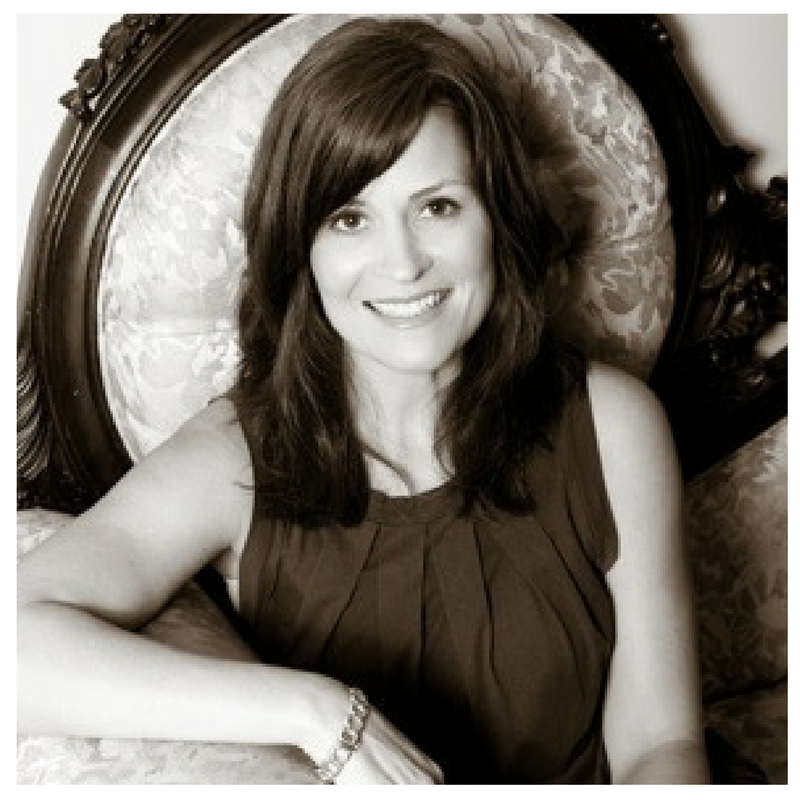
Connect with Jacqueline:
Website: www.therapymama.com
Attention Deficit Disorder Assoc.
Subscribe
Sign up to get the latest weekly blogs sent straight to your inbox


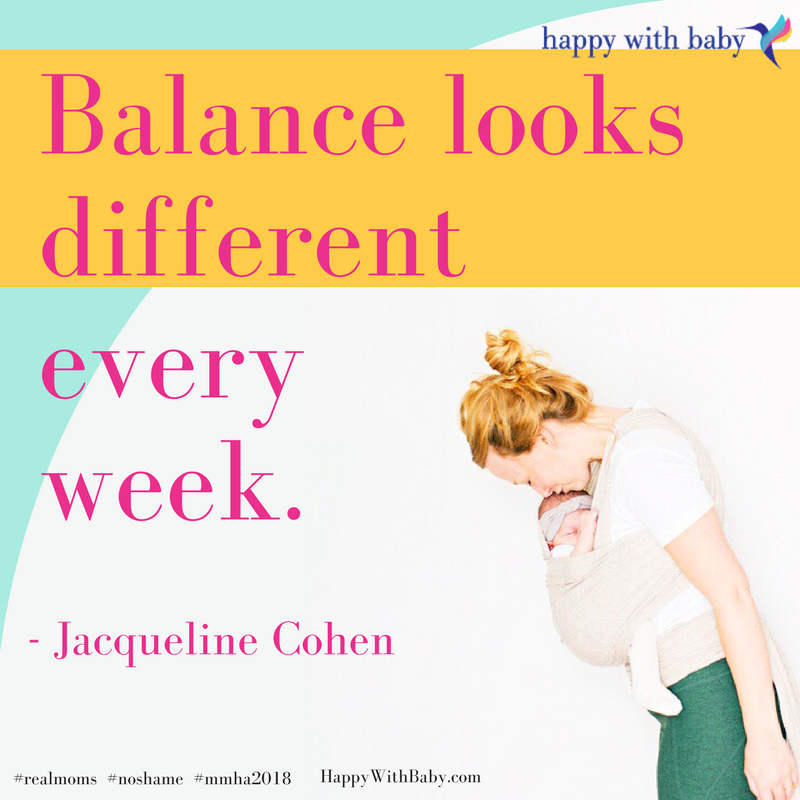
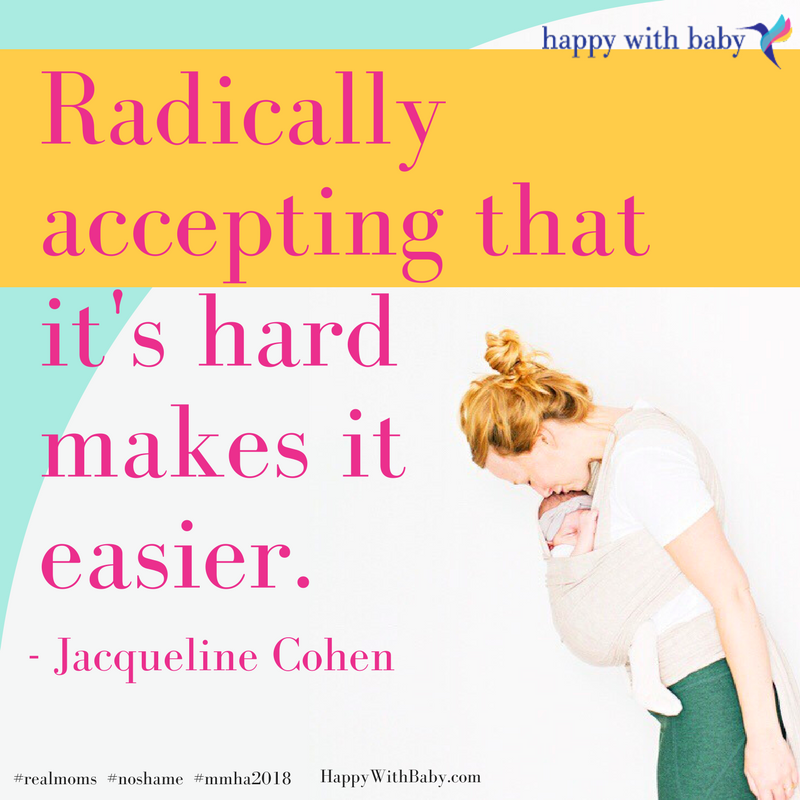
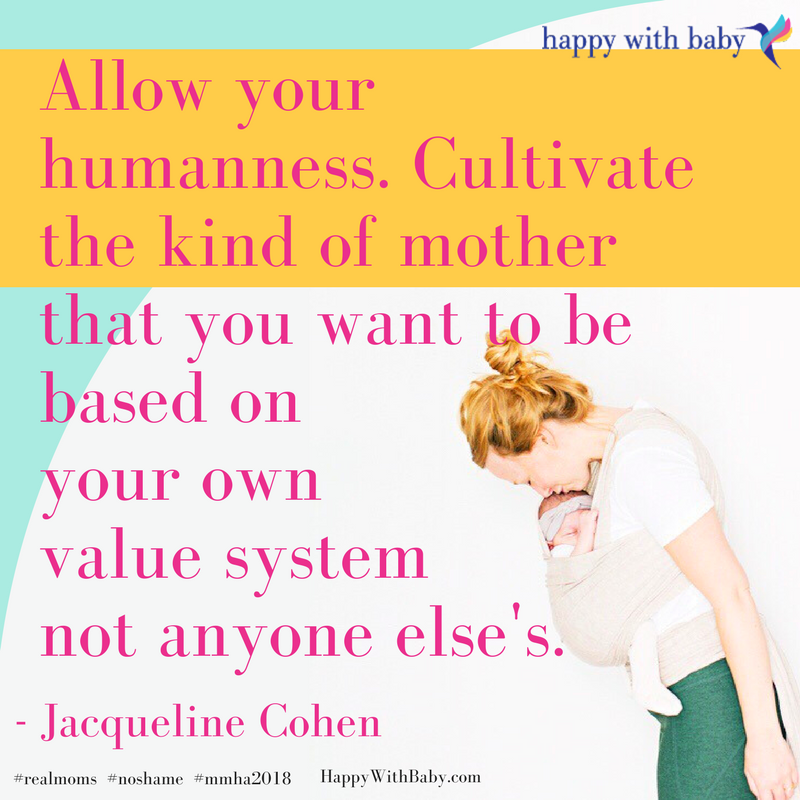
0 comments
Leave a comment
Please log in or register to post a comment